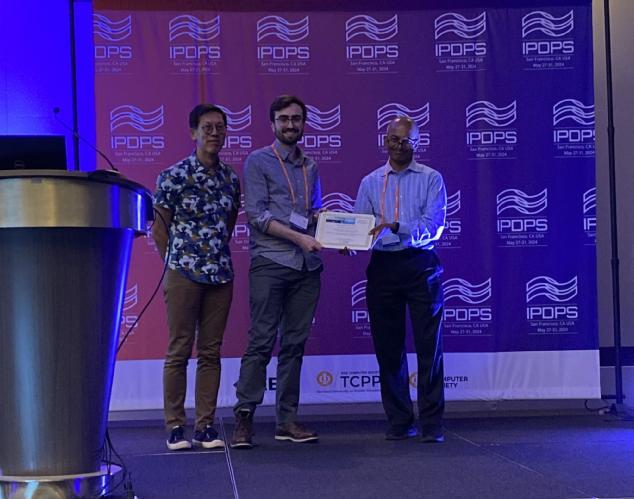Systems and Security News
Eight papers accepted to NeurIPS 2024
Eight papers authored by Computer Science researchers from Warwick have been accepted for publication at the 38th Conference on Neural Information Processing Systems, the leading international venue for machine learning research, which will be held on 10-15 December 2024 in Vancouver, British Columbia, Canada:
- Generating Origin-Destination Matrices in Neural Spatial Interaction Models, by Ioannis Zachos, Mark Girolami, and Theodoros Damoulas
- Interventionally Consistent Surrogates for Complex Simulation Models, by Joel Dyer, Nicholas Bishop, Yorgos Felekis, Fabio Massimo Zennaro, Ani Calinescu, Theodoros Damoulas, and Michael Wooldridge
- Learning the Expected Core of Strictly Convex Stochastic Cooperative Games, by Phuong Nam Tran, The Anh Ta, Shuqing Shi, Debmalya Mandal, Yali Du, and Long Tran-Thanh
- Physics-Informed Variational State-Space Gaussian Processes, by Oliver Hamelijnck, Arno Solin, and Theodoros Damoulas
- SARAD: Spatial Association-Aware Anomaly Detection and Diagnosis for Multivariate Time Series, by Zhihao Dai, Ligang He, Shuanghua Yang, and Matthew Leeke
- Symmetric Linear Bandits with Hidden Symmetry, by Phuong Nam Tran, The Anh Ta, Debmalya Mandal, and Long Tran-Thanh
- The Effectiveness of Surprisingly Popular Voting with Partial Preferences, by Hadi Hosseini, Debmalya Mandal, and Amrit Puhan
- What makes unlearning hard and what to do about it, by Kairan Zhao, Meghdad Kurmanji, George-Octavian Bărbulescu, Eleni Triantafillou, and Peter Triantafillou
SIGMOD 2024 Test of Time Award for ‘PrivBayes’
The work of Professor Graham Cormode has been recognized with a “test of time” award. The ACM SIGMOD conference presents an award each year for the paper from SIGMOD 10-12 years previously that has had the biggest impact, and passed the “test-of-time”. The 2014 paper “PrivBayes: private data release via bayesian networks” (Jun Zhang, Graham Cormode, Cecilia M. Procopiuc, Divesh Srivastava, Xiaokui Xiao) was selected for this honour. The award will be presented at the 2024 ACM SIGMOD Conference in Santiago.
Best Paper Award at IPDPS 2024

Toby Flynn, PhD student in the department's High-Performance and Scientific Computing group, supervised by Prof. Gihan Mudalige together with Dr. Robert Manson-Sawko at IBM Research UK received the best paper award at the 38th IEEE International Parallel and Distributed Processing Symposium (IPDPS 2024) last week in San Francisco US. IPDPS is one of the most prominent and high ranking conferences in parallel and distributed computing, now in its 38th year.
The paper titled "Performance-Portable Multiphase Flow Solutions with Discontinuous Galerkin Methods", details the development of a new performance portable solver workflow using Discontinuous Galerkin (DG) methods for developing multiphase flow simulations based on the OP2 domain-specific language. Results demonstrate scaling on both CPU and GPU systems including UK's national supercomputer, ARCHER2 at EPCC Edinburgh and the European Petascale Supercomputer, LUMI hosted by CSC Finland. The work is a collaboration with IBM Research UK supported by an iCASE award funded jointly by IBM and EPSRC.
The paper pre-print is available here.
